|
Lecce
14 Maggio
We only had a few wrong turns getting out of Acireale, which
after yesterday's fiasco in Monreal felt like a gift. Easy drive to the Catania
airport, where we said goodbye to our dear friend, Deborah.
Next stop, Messina, to catch the ferry to Villa San Giovanni
in Calabria. The usual confusion, after all, this is Italy. A taxi driver tried
to scam us into believing the ferry company wasn't the one we wanted, but it was
obvious he was a scam. We by-passed him, I went into the shabby terminal and
bought our tickets which were supposed to be for a crossing in 25 minutes but
didn't actually depart for an hour and 25 minutes. Is this the Sicilian
equivalent of “island time”? Perhaps.
The drive to our agriturismo was a few hours, so we didn't do
any sightseeing.
The agriturismo was pleasant, but we were the only guests. We
had dinner there. We probably could have been quite satisfied with the
antipasto, there was so much of it. We had a pasta with mushrooms, which was
very nice, then a few bites of the secondo, a pork cutlet, potatoes and what was
said to be spinach, but I think was chicory which is fresh this time of year.
Our dessert was fresh cherries grown on location.
15 Maggio
After breakfast at the agriturismo, we went into Rende, the
town nearby and did laundry, then drove to Lecce. Our apartment was in the
Centro Storico, only a few steps from the Roman amphitheater. The chaos, as
usual, trying to find the apartment and then parking.
We had a very nice dinner at a local restaurant, then walked
back to the flat.
The flat was ok, not great. There were a couple of things I
didn't like. The bed was in a loft, but the stairs didn’t have handrails, so I
worried that one of us would take a tumble. We left a light on downstairs to
make sure we could see where we were going. The shower water temperature control
was very difficult to regulate, you were either freezing or scalding. The
bathroom door was frosted glass, so you could see the outline of the person in
the bathroom. Weird.
16 Maggio
It was our day to explore Lecce, which is called the Florence
of the South. It is largely a baroque city and the predominant building material
is a light sandstone. We took a tour on a little gas-powered train. So many of
the churches in this city were designed by an architect named Zimbalo. He must
have been a very busy man. The cathedral is Baroque overload, with hundreds of
statues, columns richly decorated, side chapels.

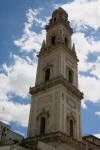
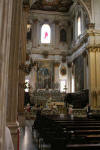
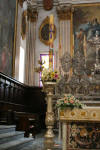 The Duomo facade, tower, altar and
Pascal candle
The Duomo facade, tower, altar and
Pascal candle
 The Roman amphitheater
The Roman amphitheater
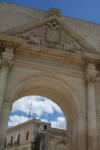
 Two gates - Porta Napoli and Porta
Rudiae
Two gates - Porta Napoli and Porta
Rudiae

 The Bishop's palace and the palace of
the province
The Bishop's palace and the palace of
the province
We discovered a Leccese treat, Tarallini. They are very simple
twisted crackers made of flour, salt and olive oil or wine. They are shaped and
then boiled, then baked until crisp. They can be sweet or salty, depending on
what is added. They are also everywhere! Young women are standing in the streets
with baskets of them, giving them to passers-by hoping they'll go into the shops
to buy them.
One of the more interesting museums we visited was a small one
about the Jews in Lecce. At first, they all lived in the same general
neighborhood out of choice, but later were somewhat segregated and forced to
wear a badge (not the yellow star of David the Nazis required). There was also a
Jewish ritual bath in the museum. After WWII many Jews were kept in Lecce while
they awaited permission to go to Israel.
Interesting, the US embassy has just been moved from Tel Aviv
to Jerusalem, so the Palestinians are protesting and upwards of 60 protesters
have been killed. I hope each of them enjoys their 72 virgins with melon shaped
breasts.
17 Maggio
We drove to Taranto to see the Castello Aragonese. Except
there are at least two of these in Puglia and the stupid GPS directed us to the
one in Brindisi. After we discovered our error, we drove to Taranto, easily
found the Castello, which is called Castel San Angelo. It is an Italian naval
installation and quite formidable looking. Unfortunately, the free tour we
planned to take was given by an officer who didn't speak English and there were
about 50 school age children on the tour. They were extremely rude, so we left
after 15 minutes. We did get a small paper with the history of the facility, so
it wasn't a total wash. Typical Italy, layer upon layer of history. Originally
the site was built by the Byzantines, then fortified by the Normans.

 Castel San Angelo and a model of
same
Castel San Angelo and a model of
same
 The steel rods through rings on
either side of the doorway hold the building together. The rings are at the ends
of rods that go all the way through the building and there is a similar setup on
the other side.
The steel rods through rings on
either side of the doorway hold the building together. The rings are at the ends
of rods that go all the way through the building and there is a similar setup on
the other side.
On the way back to Lecce we stopped at a large shopping area
and I bought a roasted chicken, potatoes and a salad, along with some prosciutto
crudo and cheese for lunch after we leave Lecce on Saturday. It is interesting
that the prepared meals one finds readily in the US aren't available in this
part of Italy.
18 Maggio
Each morning we have to hot foot it about one kilometer each
way to buy a parking ticket for our car. One of the disadvantages of staying in
the Centro Storico, but I guess it is good exercise.
We visited one of the most interesting museums we've ever been
in, Museo Archeologico Faggiano. Signor Faggiano bought an old building in the
historic center and in 2001 wanted to convert it to a restaurant, but he had to
deal with the sewer system, which was causing dampness in the building. Upon
tearing into the floor, he found successive evidence of habitation - a convent,
evidence of the Knights Templar, cisterns, escape tunnels (from the Turks), even
some evidence of habitation before Christ. It took seven years to complete the
excavation, but now you can peer though many years of history in one relatively
small building.
We also visited the Basilica di Santa Croce, also influenced
by Zimbalo in the Baroque style.

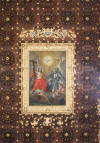 The altar and ceiling of the Basilica
di Santa Croce
The altar and ceiling of the Basilica
di Santa Croce
|